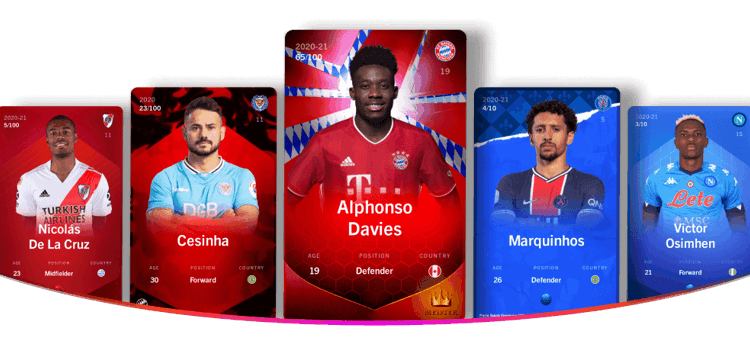Fantasy sports is a thriving global industry, with a projected market size of $48.6 billion by 2027. In traditional fantasy football or soccer games, users draft their favorite professional players, set their weekly lineups, and earn points for all of their players’ on-the-field actions in the hopes of beating their friends and more importantly, earning bragging rights.
Sorare does things a little differently. It’s still a fantasy soccer game at heart, but instead of simply picking names from a list during a draft, you buy digital trading cards that are tokenized on the Ethereum blockchain. These non-fungible token (NFT) cards are yours to keep and resell as crypto collectibles, but they’re also at the heart of Sorare’s fantasy experience. There are also prizes to be won, including cryptocurrency and rare, valuable player cards.
It’s fantasy soccer combined with true digital ownership, two concepts that have gained traction in recent months as the value of licensed sports NFTs like NBA Top Shot has gone through the roof. Here’s a quick guide of how Sorare works and how you can get started.
What makes Sorare different?
Sorare is a web-based fantasy soccer game with a cryptocurrency twist. It’s the same as traditional fantasy soccer in that you build your lineup each week using professional soccer stars, and their on-the-field stats—such as goals and assists—translate into in-game points. Your goal is to amass the most points each week in order to beat other users in the leagues.
Sorare has licensed players from over 100 international teams in a variety of leagues, and you’ll bolster your team by purchasing digital trading cards from the marketplace. Juventus, AC Milan, Liverpool FC, Paris Saint-Germain FC, Real Madrid, and all of Japan’s J.League teams and Spain’s LaLiga, as well as every player in Major League Soccer, are among the licensed teams (but not the clubs themselves).
How does Sorare work?
You can sign up for a variety of leagues in the game, including a rookie league for newcomers, specific regional leagues, and even one solely for lineups with young players under the age of 23. Once you’ve joined a league, you can use the cards in your account to create a new lineup each week. Following the completion of the week, the in-game points are tallied based on all of the players’ real-world performances, and the Sorare users with the most points are eligible to win ETH and rare cards as rewards.
How to Play Sorare
You can start playing Sorare for free, just like any other free-to-play game, crypto-infused or not. Simply sign up at the Sorare website and follow the on-screen instructions to receive up to 12 free “Common” player cards.
These cards have no real-world value and cannot be sold, but they can be used in fantasy leagues in the same way as any other card in the game. During the sign-up process, you will select your favorite teams from among the licensed squads, enter your first league, and create a lineup.
It’s a simple onboarding process that guides you through the fundamentals before dropping you into the Market to consider purchasing premium NFT cards that are tokenized on the Ethereum blockchain. The “New Signings” tab allows you to bid on new cards added to the game, while the “Transfer Market” tab allows users to resell their own cards at a fixed price—typically much higher than when they were first released.
You can learn all the ins and outs by visiting Sorare.
Final thoughts
Sorare has also expanded beyond fantasy football with the September 2021 release of its Legends NFT collection, a series of trading cards based on iconic retired football players such as Franz Beckenbauer, Diego Maradona, and Michel Platini.
Soccer is a truly global game, and Sorare already has licenses from Europe, America, and Asia—and they’ve hinted at plenty more to come—with the potential for millions more users to get hooked on Sorare’s one of a kind take on fantasy sports, this is a game to keep an eye on.
If you enjoyed this article you might also like: 7 Hot NFT Games You Should Know About










